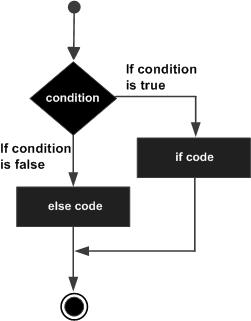Pascal - if-then-else Statement
- Details
- Category: Chapter 2
- Published: Sunday, 14 April 2013 14:27
- Written by Sternas Stefanos
- Hits: 35676
An if-then statement can be followed by an optional else statement, which executes when the Boolean expression is false.
1. Syntax:
Syntax for the if-then-else statement is:
if condition then S1 else S2;
Where, S1 and S2 are different statements. Please note that the statement S1 is not followed by a semicolon. In the if-then-else statements, when the test condition is true, the statement S1 is executed and S2 is skipped; when the test condition is false, then S1 is bypassed and statement S2 is executed.
For example,
if color = red then
writeln('You have chosen a red car')else
writeln('Please choose a color for your car');
If the boolean expression condition evaluates to true then the if-then block of code will be executed otherwise the else block of code will be executed.
Pascal assumes any non-zero and non-nill values as true and if it is either zero or nill then it is assumed as false value.
2. Flow Diagram:

3. Example 1:
Let us try a complete example that would illustrate the concept:
program ifelseChecking;
var
{Global variable definition }
a : integer;
begin
a :=100;
(* check the boolean condition *)
if( a = 20)then
(*if condition istruethenprint the following *)
writeln('a is less than 20')
else
(*if condition isfalsethenprint th following *)
writeln('a is not less than 20');
writeln('value of a is : ', a);
end.
When the above code is compiled and executed, it produces following result:
a is not less than 20 value of a is : 100
4. The if-then-else if-then-else Statement
An if-then statement can be followed by an optional else if-then-else statement, which is very useful to test various conditions using single if-then-else if statement.
When using if-then , else if-then , else statements there are few points to keep in mind.
- An if-then statement can have zero or one else's and it must come after any else if's.
- An if-then statement can have zero to many else if's and they must come before the else.
- Once an else if succeeds, none of the remaining else if's or else's will be tested.
- No semicolon (;) is given before the last else keyword, but all statements can be compound statements.
5. Syntax:
The syntax of an if-then-else if-then-else statement in Pascal programming language is:
if(boolean_expression 1)then S1 (*Executeswhen the boolean expression 1istrue*)elseif( boolean_expression 2)then S2 (*Executeswhen the boolean expression 2istrue*)elseif( boolean_expression 3)then S3 (*Executeswhen the boolean expression 3istrue*)else S4;(* executes when the none of the above condition istrue*)
6. Example 2:
The following example illustrates the concept:
program ifelse_ifelseChecking;
var
{Global variable definition }
a : integer;
begin
a :=100;
(* check the boolean condition *)
if(a =10) then
(*if condition istruethenprint the following *)
writeln('Value of a is 10')
else if( a =20)then
(*ifelseif condition istrue*)
writeln('Value of a is 20')
else if( a =30)then
(*ifelseif condition istrue *)
writeln('Value of a is 30')
else
(*if none of the conditions istrue*)
writeln('None of the values is matching');
writeln('Exact value of a is: ', a );
end.
When the above code is compiled and executed, it produces following result:
None of the values is matching Exact value of a is: 100

